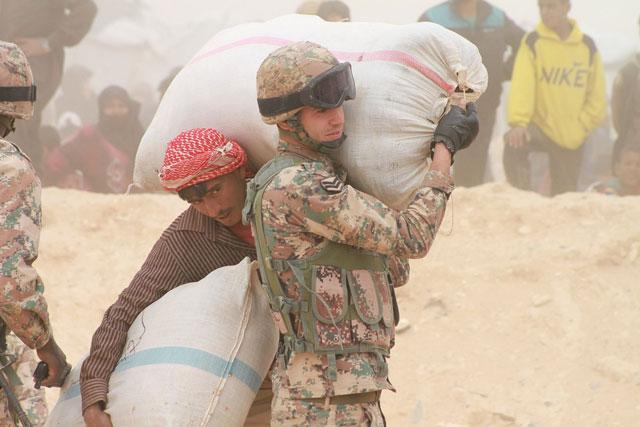You are here
MSF says aid to refugees stranded near border ‘cannot wait’
By Dana Al Emam - Jul 01,2016 - Last updated at Jul 01,2016
AMMAN — Médecins Sans Frontières (MSF) on Thursday called on the international community to shoulder its responsibilities towards the displaced Syrians in the no-man's land between Syria and Jordan.
The medical aid group said the lives of some 60,000 people were at stake due to the absence of food and medical assistance, with extremely limited amounts of drinking water available.
"These people, more than 50 per cent of whom are children, desperately need the immediate resumption of the provision of food, water and medical care. This cannot wait," said MSF Operation Manager Benoit De Gryse in a meeting with the press.
Jordanian authorities sealed the border on June 21 after a car bomb exploded at a military post in the Rakban area, killing seven Jordanian troops and injuring 13 others.
The Daesh terrorist group claimed responsibility for the attack, which was carried out close to the makeshift encampment of Syrian refugees.
Deputy Prime Minister and Foreign Minister Nasser Judeh asked envoys of world powers and representatives of international organisations to find alternative ways to deliver aid to the stranded refugees.
Before the border closure and the suspension of aid delivery, MSF had been providing medical assistance to the trapped individuals through a mobile health clinic in Rweished in Mafraq, a three-hour drive from the location of the informal camp, known as the "berm".
MSF started running the mobile clinic on May 16 and treated some 3,500 people, with common cases of skin diseases, diarrhoea and malnutrition, according to De Gryse, who added that the teams provided consultations for 450 pregnant women and delivered one baby.
Drinking water has only reached the informal camp in the last two days, in quantities as low as 1.5 litres per person, he said, noting that 5 litres per person is internationally recognised as the quantity needed in emergencies.
Jordan now hosts 1.26 million Syrian refugees according to government figures, and only half of them are registered with UN agencies.
But the Syrian refugees camped in the no-man’s land, estimated to number 100,000 by Jordanian authorities, came from Syria’s northeast, which is controlled by the Daesh terror group.
De Gryse said the medical organisation respects Jordan's security concerns, citing immediate aid resumption as a "collective" responsibility among all nations.
The organisation's representative said neither returning to safe zones in Syria nor staying in the berm is an option, stressing the need for the safe relocation of the trapped population.
"States with [capacity] should not turn their backs. They need to step up and offer asylum to refugees today," he said; otherwise refugees will suffer starvation and dehydration, "and we will be confronted with preventable deaths".
Related Articles
AMMAN — Based on recent developments and upon further discussions with international agencies, Jordan will allow the delivery of aid to the
AMMAN — Reports about the resumption of humanitarian aid to at least 75,000 displaced Syrians stranded in the no-man’s-land along the Jordan
AMMAN — The Kingdom only allows the entry of humanitarian cases of displaced Syrians stranded in the berm area, the no-man’s- land between t

















